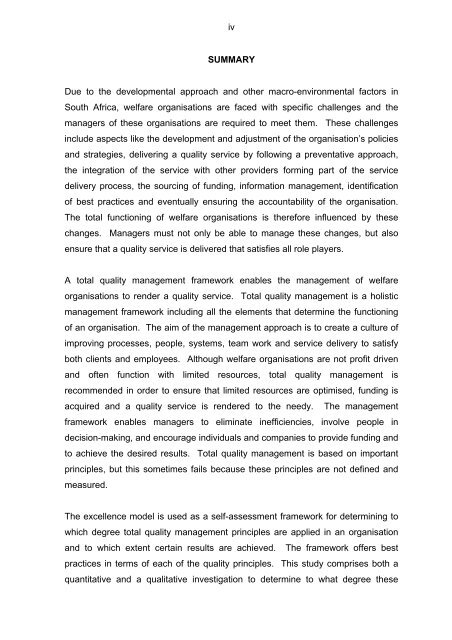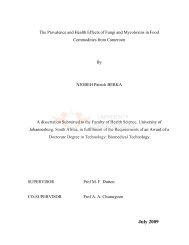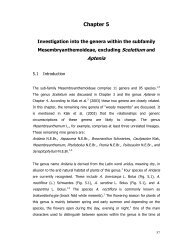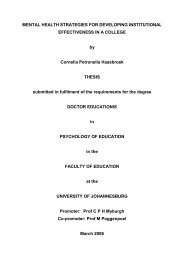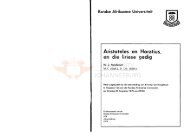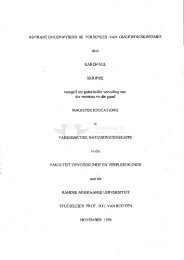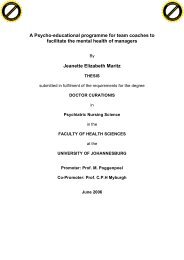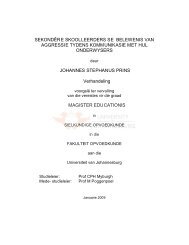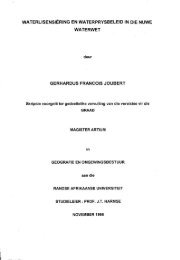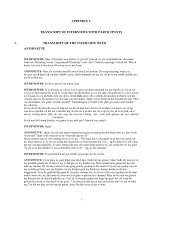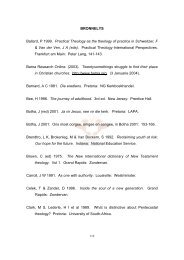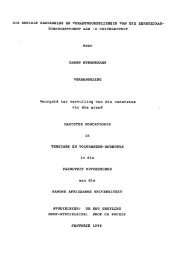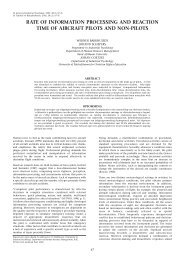- Page 1 and 2: ‘N EVALUERING VAN UITNEMENDHEID B
- Page 3 and 4: i DANKBETUIGING Sonder die liefde,
- Page 5: iii Die studie het ’n kwantitatie
- Page 9 and 10: vii Bladsy 1.6.4 Kwaliteit 21 1.6.5
- Page 11 and 12: ix HOOFSTUK 3: LITERATUURHOOFSTUK:
- Page 13 and 14: xi Bladsy 3.8.5.3 Gemeenskapswerk 1
- Page 15 and 16: xiii Bladsy 4.4.8 Totale kwaliteits
- Page 17 and 18: HOOFSTUK 5: LITERATUURHOOFSTUK: SUI
- Page 19 and 20: xvii HOOFSTUK 6: KWANTITATIEWE RESU
- Page 21 and 22: xix Bladsy 6.7.3 Getal kliënte aan
- Page 23 and 24: xxi Bladsy 7.4.4.1 Leierskap: Krite
- Page 25 and 26: xxiii Bladsy 8.5 Voorlegging van di
- Page 27 and 28: xxv BRONNELYS 455 ADDENDUM: Addendu
- Page 29 and 30: xxvii Bladsy Figuur 6.1 Vlak een: K
- Page 31 and 32: xxix LYS VAN TABELLE Bladsy Tabel 1
- Page 33 and 34: xxxi Bladsy Tabel 6.19 Diagnostiese
- Page 35 and 36: 1.1 INLEIDING 1 HOOFSTUK 1 ORIËNTE
- Page 37 and 38: 3 Hoewel die model reeds in 1997 vi
- Page 39 and 40: 5 • Die verandering in die diensl
- Page 41 and 42: 7 1.2.2 Totale kwaliteitsbestuur as
- Page 43 and 44: 1.2.3 Organisasie-uitnemendheid deu
- Page 45 and 46: 11 Tabel 1.1: Kriteria-elemente van
- Page 47 and 48: 1.3 PROBLEEMSTELLING 13 Die volgend
- Page 49 and 50: • Leierskap; • Beleid en strate
- Page 51 and 52: 17 • Die onderneming van ’n lit
- Page 53 and 54: 19 Die navorser maak hoofsaaklik va
- Page 55 and 56: 21 organisasie word as ‘n entitei
- Page 57 and 58:
Dit vereis ’n veranderde ingestel
- Page 59 and 60:
25 • Martin (1993:2) haal Mossard
- Page 61 and 62:
27 HOOFSTUKTEMA HOOFSTUK Literatuur
- Page 63 and 64:
2.1 INLEIDING 29 HOOFSTUK 2 NAVORSI
- Page 65 and 66:
31 Tabel 2.1: Vergelykende tabel va
- Page 67 and 68:
33 KENMERKE VAN KWALITATIEWE EN KWA
- Page 69 and 70:
35 skaplike bestuur en administrasi
- Page 71 and 72:
37 action; they are ordinarily supp
- Page 73 and 74:
39 Die navorser het programevalueri
- Page 75 and 76:
41 2.4 IMPLEMENTERING VAN PROGRAMEV
- Page 77 and 78:
43 omskrywing van kwaliteit en uitn
- Page 79 and 80:
45 2.4.3.4 Stap 4: Spesifiseer doel
- Page 81 and 82:
47 • Professionele artikels in da
- Page 83 and 84:
49 o South African Excellence Found
- Page 85 and 86:
Ontwerp verskillende wyses van afle
- Page 87 and 88:
53 van dié organisasie ontvang. Di
- Page 89 and 90:
55 2.4.5.5 Stap 12: Beloning van ve
- Page 91 and 92:
57 2.4.8.1 Kwalitatiewe navorsingsp
- Page 93 and 94:
59 2.4.10.1 Administratiewe en logi
- Page 95 and 96:
2.4.12 Fase 9: Aanbevelings 61 Die
- Page 97 and 98:
63 • Die toepasbaar en oordraagba
- Page 99 and 100:
65 HOOFSTUK 3 LITERATUURHOOFSTUK BE
- Page 101 and 102:
67 Die veranderinge en uitdagings v
- Page 103 and 104:
69 Die bekamping van armoede deur
- Page 105 and 106:
3.2.2 Omskrywing van begrippe 71 3.
- Page 107 and 108:
73 3.2.3 Die uitdagings wat die ont
- Page 109 and 110:
75 3.3 WELSYNSTRATEGIEË, SIONELE M
- Page 111 and 112:
Die missie is volgens die Witskrif:
- Page 113 and 114:
79 Tabel 3.1: Interne en eksterne m
- Page 115 and 116:
81 Die behoeftes van mense en gemee
- Page 117 and 118:
83 “Programme related goals defin
- Page 119 and 120:
85 Tabel 3.2: Beginsels waarop maat
- Page 121 and 122:
87 Tabel 3.3: Klassifikasie van die
- Page 123 and 124:
89 Tabel 3.4: Breë kategorieë van
- Page 125 and 126:
91 • Die klem moet op ’n voorko
- Page 127 and 128:
93 miljoen manlik. Vroue is dus in
- Page 129 and 130:
95 Die meeste oortreders is jong sw
- Page 131 and 132:
97 Die navorser is van mening dat d
- Page 133 and 134:
99 Dieselfde geld vir diensverskaff
- Page 135 and 136:
101 Voorbeelde hiervan is onder mee
- Page 137 and 138:
DIENSLEWERINGSVELDE 103 Tabel 3.6:
- Page 139 and 140:
105 “the voluntary behaviour unde
- Page 141 and 142:
107 lik gestel deur die politieke p
- Page 143 and 144:
109 Die verbetering van welsynsorga
- Page 145 and 146:
111 Indien befondsers as kliënte b
- Page 147 and 148:
113 • Subsidiëring van programme
- Page 149 and 150:
115 o Interneprosespersektief: Foku
- Page 151 and 152:
117 maatskaplike werkers weens aant
- Page 153 and 154:
119 skaplike werkers goeie bestuurd
- Page 155 and 156:
121 noem die mikrovaardighede wat v
- Page 157 and 158:
123 3.8.6 Die personeeluitdagings w
- Page 159 and 160:
125 doelwitbereiking tussen twee in
- Page 161 and 162:
127 “The capacity of an organisat
- Page 163 and 164:
129 Tabel 3.8: Voorgestelde prestas
- Page 165 and 166:
131 Tabel 3.9: Voorbeelde van prose
- Page 167 and 168:
• Ontwikkelingsbenadering; 133
- Page 169 and 170:
135 Die druk om op finansiële en a
- Page 171 and 172:
137 handhaaf. ‘n Oop sisteem bete
- Page 173 and 174:
139 is dit sinvol om die proses te
- Page 175 and 176:
141 PROSESELEMENT MAATSKAPLIKE VOOR
- Page 177 and 178:
143 Tabel 3.11: Instaatstellende Be
- Page 179 and 180:
145 Tabel 3.12: Makro-omgewingsfakt
- Page 181 and 182:
147 Patel (2005:268) beskryf die or
- Page 183 and 184:
149 Die navorser oordeel dat totale
- Page 185 and 186:
151 Vanaf 1990 is die neiging om me
- Page 187 and 188:
153 soveel welslae toegepas kan wor
- Page 189 and 190:
155 • Die eerste beginsel verwys
- Page 191 and 192:
157 “Quality management is focuse
- Page 193 and 194:
159 Die navorser definieer kwalitei
- Page 195 and 196:
161 uitsette assesseer en met die v
- Page 197 and 198:
163 Senge, Roberts, Ross, Smith en
- Page 199 and 200:
165 Martin (1993:2) haal Mossard (1
- Page 201 and 202:
167 Aangesien die prosesse van Shig
- Page 203 and 204:
169 4.3.5.2.3 J.M. Juran in Juran (
- Page 205 and 206:
171 4.3.5.2.5 Saylor (1992) omskryf
- Page 207 and 208:
173 Die konsep van uitnemendheid en
- Page 209 and 210:
175 “From a focus on pathology an
- Page 211 and 212:
177 In die laaste vyftig jaar was d
- Page 213 and 214:
179 Totale kwaliteitsbestuur wat op
- Page 215 and 216:
181 4.4.5 Totale kwaliteitsbestuur
- Page 217 and 218:
183 Hierdie mededinging kan bestuur
- Page 219 and 220:
185 Sinah (1997:43) is van mening d
- Page 221 and 222:
187 van toepassing sal wees. Enersy
- Page 223 and 224:
• Professionele verantwoordbaarhe
- Page 225 and 226:
191 4.5.2 Die maatskaplike werker s
- Page 227 and 228:
193 Die navorser is van mening dat
- Page 229 and 230:
4.5.4.2 Interne kliënte 195 Die ro
- Page 231 and 232:
197 4.5.4.5 Die verskaffing van ‘
- Page 233 and 234:
199 leweringsiklus voltooi (sien Fi
- Page 235 and 236:
201 “Partnering is a long-term co
- Page 237 and 238:
203 werklike behoefte en gepaste op
- Page 239 and 240:
VERSKAFFERS 205 KONSULTASIEPROSES:
- Page 241 and 242:
207 Die tweede uitdaging is die gro
- Page 243 and 244:
• Martin en Kettner (1996:42);
- Page 245 and 246:
211 • Prosesmetings: (Aspekte wat
- Page 247 and 248:
213 Die navorser gee toe dat beperk
- Page 249 and 250:
215 Van Niekerk (1998:246) voer aan
- Page 251 and 252:
217 4.6.3 Totale kwaliteitsbestuur:
- Page 253 and 254:
219 staat, besighede en die welsyns
- Page 255 and 256:
221 “Top managers continue to fee
- Page 257 and 258:
223 • Die koste van swak kwalitei
- Page 259 and 260:
225 Tabel 4.8: ‘n Samevatting wat
- Page 261 and 262:
UITDAGINGS VAN ONTWIKKELINGS- BENAD
- Page 263 and 264:
229 HOOFSTUK 5 LITERATUURHOOFSTUK S
- Page 265 and 266:
231 • Prosesse moet gedokumenteer
- Page 267 and 268:
233 Tabel 5.1: Geïntegreerde aanbi
- Page 269 and 270:
5.2.3 Samevatting 235 Om totale kwa
- Page 271 and 272:
237 • Die georganiseerde raamwerk
- Page 273 and 274:
1. Leierskap 239 INSETTE PROSESSE U
- Page 275 and 276:
241 heidsraamwerk verantwoordelik i
- Page 277 and 278:
243 waaruit die sisteem bestaan, en
- Page 279 and 280:
245 Dis belangrik om ’n duidelike
- Page 281 and 282:
247 en groepbesprekings) geïdentif
- Page 283 and 284:
249 Tabel 5.3: Die elf kriteria-ele
- Page 285 and 286:
251 7a Die gemeenskap se persepsie
- Page 287 and 288:
253 Die navorser het ten doel om di
- Page 289 and 290:
5.6 SELFASSESSERING 5.6.1 Omskrywin
- Page 291 and 292:
257 Tabel 5.6: Stigting vir Organis
- Page 293 and 294:
259 • assessering wat berus op fe
- Page 295 and 296:
H E R S I E N V O R D E R I N G Ont
- Page 297 and 298:
263 5.6.5.1 Simulasie van die toeke
- Page 299 and 300:
265 Toepassing in welsynsorganisas
- Page 301 and 302:
267 • Bied geen geleentheid om di
- Page 303 and 304:
269 Tabel 5.7: Die seleksie van die
- Page 305 and 306:
271 Alhoewel geen welsynsorganisasi
- Page 307 and 308:
273 suksesvol sal wees in die toepa
- Page 309 and 310:
275 Ten spyte van die reaksie is 15
- Page 311 and 312:
Die model is dus nie die volgende n
- Page 313 and 314:
279 5.8.3 Verbintenis van bestuur e
- Page 315 and 316:
281 • Vir 85% organisasies het di
- Page 317 and 318:
283 HOOFSTUK 6 KWANTITATIEWE RESULT
- Page 319 and 320:
285 6.2 VRAELYS METINGSELEMENTE Tab
- Page 321 and 322:
287 Kriteriaresultate: Die navorser
- Page 323 and 324:
289 dus gerig op die opinies van di
- Page 325 and 326:
Grafiek 6.2: Hoof- of takkantore 29
- Page 327 and 328:
293 6.4.5 Tydstoedeling vir die ver
- Page 329 and 330:
6.4.7 Posvlak 45 44 43 42 41 40 44
- Page 331 and 332:
297 Daar is nie ‘n groot verskil
- Page 333 and 334:
299 6.5 FAKTORANALISE VAN ORGANISAS
- Page 335 and 336:
301 teerde kultuur. Die navorser he
- Page 337 and 338:
303 Tabel 6.3: Faktormatriks Faktor
- Page 339 and 340:
Kriterium Leierskap Pearson- Korrel
- Page 341 and 342:
307 Tabel 6.7: Itemstatistiek van l
- Page 343 and 344:
309 Die MSA-meting is die meting va
- Page 345 and 346:
311 Tabel 6.14: KMO en Bartlett se
- Page 347 and 348:
313 Tabel 6.19: Diagnostiese korrel
- Page 349 and 350:
315 Tabel 6.23: Betroubaarheidstati
- Page 351 and 352:
317 Tabel 6.27: Die implikasie van
- Page 353 and 354:
319 Die gemiddelde meting van leier
- Page 355 and 356:
321 Tabel 6.32: Gemiddelde meting v
- Page 357 and 358:
323 steun, die versekering wil hê
- Page 359 and 360:
325 ’n baie groot mate gedoen en
- Page 361 and 362:
6.6.7 Prosesbestuur 327 Tabel 6.40:
- Page 363 and 364:
6.6.8 Implementeringsvermoë 329 Ta
- Page 365 and 366:
Resultate- kriteria Impak op gemeen
- Page 367 and 368:
333 gemeet. Die prestasie van versk
- Page 369 and 370:
335 Op grond hiervan kan aangedui w
- Page 371 and 372:
337 Tydstoekenning van die meeste/2
- Page 373 and 374:
339 Die p-waarde van hulpbronbestuu
- Page 375 and 376:
341 Grafiek 6.18: Die effekgrootte
- Page 377 and 378:
343 Ha: Die mate waarin die respond
- Page 379 and 380:
345 • Derde Hipotese: Nulhipotes
- Page 381 and 382:
347 • Ten derde is bepaal watter
- Page 383 and 384:
349 Tabel 6.47: Gemiddelde en stand
- Page 385 and 386:
351 • Areas van verbetering: Ofsk
- Page 387 and 388:
• Areas van verbetering: 353 Die
- Page 389 and 390:
355 Voldoening aan statutêre vere
- Page 391 and 392:
357 nemers en kliënte deur onmidde
- Page 393 and 394:
359 aangepas word. Die bestuur van
- Page 395 and 396:
361 • Tweedens om die benutting v
- Page 397 and 398:
363 7.2.5 Die identifisering van ka
- Page 399 and 400:
365 7.3.2 Hoe kredietwaardig is die
- Page 401 and 402:
367 en verbande op verskeie maniere
- Page 403 and 404:
369 • Die benadering vereis dat m
- Page 405 and 406:
371 7.4.4.2 Leierskap: Subkategorie
- Page 407 and 408:
373 7.4.4.3 Beleid en strategie: Kr
- Page 409 and 410:
375 7.4.4.6 Kliënt-en-belangegroep
- Page 411 and 412:
377 Die werksomstandighede van maa
- Page 413 and 414:
• Inligtingsbestuur: 379 Daar be
- Page 415 and 416:
381 7.4.4.14 Resultaatmeting: Werkn
- Page 417 and 418:
7.5.2 Temas en patrone 383 • Uitn
- Page 419 and 420:
385 Tabel 7.2: ‘n Vergelyking van
- Page 421 and 422:
KRITERIA- ELEMENTE VAN UITNEMENDHEI
- Page 423 and 424:
389 • Die belangrikheid van ‘n
- Page 425 and 426:
8.2 GEVOLGTREKKINGS 391 Die navorse
- Page 427 and 428:
393 die internasionale raamwerk mee
- Page 429 and 430:
395 aan die kwantitatiewe en kwalit
- Page 431 and 432:
kLIIn 2. Leierskap Instaatstellende
- Page 433 and 434:
399 KRITERIA: SUBKRITERIA: Kriteriu
- Page 435 and 436:
401 8.4 UITNEMENDHEIDSKRITERIA-RIGL
- Page 437 and 438:
403 1b) Hoe die beleid en strategie
- Page 439 and 440:
8.4.2 Kriterium 2: Leierskap 8.4.2.
- Page 441 and 442:
407 • Moedig werknemers aan om ne
- Page 443 and 444:
8.4.3.3 Subkriteria Primêre kliën
- Page 445 and 446:
411 3d) Hoe kliënte se klagtes han
- Page 447 and 448:
413 8.4.4 Kriterium 4: Bestuur van
- Page 449 and 450:
415 4d) Hoe die diversiteit van wer
- Page 451 and 452:
8.4.5 Kriterium 5: Hulpbronbestuur
- Page 453 and 454:
8.4.6 Kriterium 6: Finansiële best
- Page 455 and 456:
8.4.7 Kriterium 7: Prosesse 8.4.7.1
- Page 457 and 458:
423 • Verskaf deurlopend terugvoe
- Page 459 and 460:
Toepaslikheid; Aanspreeklikheid;
- Page 461 and 462:
427 Doelwitte het wat deur ‘n pr
- Page 463 and 464:
429 8.5.4 Kriterium 11: Prestasie v
- Page 465 and 466:
431 8.5.5 Kriterium 12: Impak van d
- Page 467 and 468:
433 Figuur 8.2: Selfassesseringsvra
- Page 469 and 470:
435 IN WATTER MATE VIND DIE KRITERI
- Page 471 and 472:
437 8.6.2 Die voordele van selfasse
- Page 473 and 474:
439 8.6.3.5 Stap 5: Bepaal die prio
- Page 475 and 476:
441 8.8 AANBEVELINGS AANGAANDE DIE
- Page 477 and 478:
443 raamwerk. Elk van die kriteria-
- Page 479 and 480:
445 word, die aard van hulle werkso
- Page 481 and 482:
447 praktykleiers in ‘n standaard
- Page 483 and 484:
449 8.9 STRATEGIESE AANBEVELINGS VI
- Page 485 and 486:
451 8.10 AANBEVELINGS VIR VERDERE N
- Page 487 and 488:
453 Suid-Afrikaanse Stigting vir Ui
- Page 489 and 490:
455 BRONNELYS Abott, L. (1955). Qua
- Page 491 and 492:
457 Cowell, D. (1991). The marketin
- Page 493 and 494:
459 Edwards, C.D. (October 1968). T
- Page 495 and 496:
461 Hathaway, R.S. (1995). Assumpti
- Page 497 and 498:
463 Ludik, B. & Nel, J.B.S. (August
- Page 499 and 500:
465 Patton, M.Q. (1987). How to use
- Page 501 and 502:
467 Republic of South Africa. (2000
- Page 503 and 504:
469 Singh, K.K (2002). The strategy
- Page 505 and 506:
471 Toffler, A. (1980). The third w
- Page 507 and 508:
ADDENDUM KWANTITATIEWE ONDERSOEK: V
- Page 509 and 510:
No research was previously done on
- Page 511 and 512:
A) Background Information: About yo
- Page 513 and 514:
5. What types of services does your
- Page 515 and 516:
14. Have a strategy and policy cons
- Page 517 and 518:
24. Does the organisation provide h
- Page 519 and 520:
34. Is the security of assets manag
- Page 521 and 522:
44. Does the management have the kn
- Page 523:
57. Are service and delivery times


